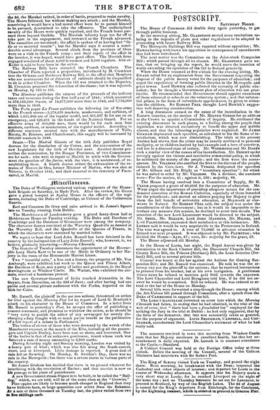POSTSCRIPT.
SATURDAY NIGHT.
The House of Commons did double duty again yesterday, to get through public business. At the morning sitting, Mr. GLanirrotta moved some resolutions re* lating to the deposits of plans and other regulations to be adopted in proceeding with future Railway Bills.
The Metropolis Buildings Bill was reported without opposition ; Mr. HAWES having withdrawn his opposition in consequence of amendments
introduced. The had been ntroduced.
The next matter was the Committee on the Joint-stock Companies Bill ; which passed through all its clauses. Mr. GLADSTONE gave no- tice, that on bringing up the report, be would move the insertion of words extending the operation of the hill to Ireland generally. When the House resumed at five o'clock for the evening sitting, Mr. EWART called for an explanation from the Government respecting the disposal of the public money voted for the purposes of education ; and urged the expediency of forming public libraries in the Metropolis and great towns. Lord Howlett also enforced the necessity of public edu- cation; but he thought a Government plan of education was not prac- ticable. He recommended that Government should appoint examiners of those educated at schools on the voluntary system ; and that substan- tial prizes, in the form of subordinate appointments, be given to stimu- late the children. Sir ROBERT PEEL thought Lord Howick's sugges- tion well deserving consideration.
A long discussion ensued on the cause of the incendiarism in the Eastern counties, on the motion of Mr. MILNER GIBSON for an address to the Crown to appoint a Commission of inquiry. He attributed the existing discontent in such places, to a feeling among the people that legislation was directed exclusively to benefit the upper and middle classes, and that the labouring population were neglected. Sir JAMES GRAHAM deprecated such speeches, as calculated to fan the flame of in- cendiarism, which was now diminishing. The trials at the present Assizes bad shown that the crime may be usually attributed to personal malignity, or to children incited by bad example and a love of notoriety, and not to a diseased state of society. Mr. WODEHOUSE and Mr. DARBY took a similar view of the causes of the incendiarism. Mr. BRIGHT spoke strongly against the vicious and restrictive commercial policy, to which he attributed the misery of the people ; and the fires were the conse- quence. Mr. VILLIERS also ascribed the fires to the distress of the people, induced by the Corn-laws. Sir J. TYP.ELL designated the speeches of Mr. Gibson and Mr. Bright as " incendiary speeches": for which he was called to order by Mr. Weems. On a division, the numbers were—For the motion, 41 ; against it, 130 ; majority, 89.
The House having resolved into a Committee of Supply, Sir G. CLERK proposed a grant of 40,0001. for the purposes of education. Mr. WYSE urged the importance of providing adequate means for the sea- demical education of the Roman Catholics, especially of those intended • for the priesthood ; and moved an address praying her Majesty to give them the full benefit of university education, at Maynooth or else- where in Ireland. Sir ROBERT PEEL said, the subject was under the consideration of the Government ; but as it would be impossible to in- troduce any measure this session, he declined to enter into details. The attention of the new Lord-Lieutenant would be directed to the subject. Mr. SHEIL, Mr. BELLEW, Lord JOHN MANNERS, Mr. MILNES, and Lord PALMERSTON, expressed their satisfaction at this intimation. Mr. LEPROY said it would be very unpalatable to the Protestants in Ireland. The vote was agreed to. A vote of 75,000/. to advance education in Ireland was next proposed. It was objected to by Mr. PLtratisree ; who divided the House—Ayes, 87; noes, 30: majority for the grant, 57.
The House adjourned till Monday.
In the House of Lords, last night, the Royal Assent was given by commission to the Bank Charter Bill, the Dissenters' Chapels Bill, the County Rates Bill, the Prisons (Scotland) Bill, the Loan Societies (Ire- land) Bill, and to several private bills, Counsel was heard at the bar against the Actions for Gaming Sus- pension Bill; and Mr. Russell was examined. He said he was the at- torney and not the plaintiff in the actions; that he received instructions to proceed from his brother, but at his own instigation. A gentleman whose name be refused to mention paid 900/. towards the expenses. The Lord Chancellor and Lord Brougham told him, if he did not an- swer he would be committed. Still he refused. He was ordered to at- tend at the bar of the House on Monday.
Several bills were forwarded a step through the House; among which the Art-Unions bill passed through Committee, after a speech from the Duke of CAMBRIDGE in support of the bill.
The LORD CHANCELLOR corrected an error into which the Morning Chronicle had fallen, in stating that he had admitted, in the trial of the writ of error, that " there had been a fraudulent list" employed for the striking the Jury in the trial at Dublin : he had only suggested, that by the form of the demurrer, that fact was necessarily taken as granted, for the purpose of argument. Lords Bstottonau, CAMPBELL, and COT.. TENHAM, corroborated the Lord Chancellor's statement of what he bad• really said.


























 Previous page
Previous page